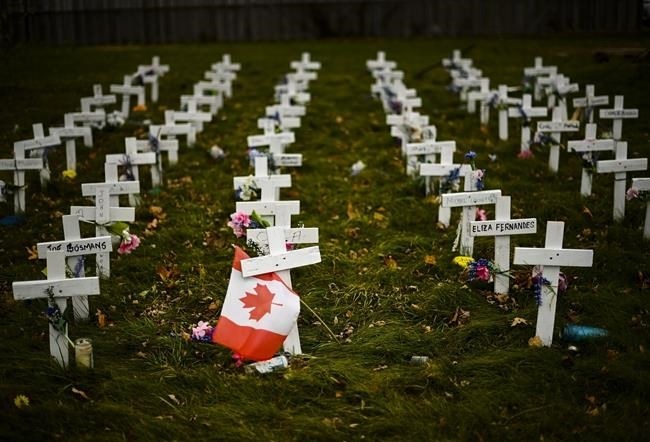
Crosses are displayed in memory of residents who died from COVID-19 at the Camilla Care Community facility in Mississauga, Ont., on Nov. 19, 2020.
Image Credit: THE CANADIAN PRESS/Nathan Denette
January 31, 2021 - 11:08 AM
When Thelma Coward-Ince donned her uniform in 1954, she was believed to be the first Black reservist in the Royal Canadian Navy.
Decades later, the strong, hard-working great-grandmother moved into the Northwood long-term care facility in Halifax due to dementia. She lived there for five years among other navy veterans until a deadly virus began silently and rapidly spreading last spring.
Coward-Ince, a woman who spent her life breaking down racial barriers and became a pillar of the Black community in Halifax, died April 17 after testing positive for the novel coronavirus.
More than 20,000 Canadians have now died from COVID-19.
Since the first death last March, health officials across the country have shared the grim daily numbers of the pandemic’s fatal toll.
There have been grandparents, parents, single mothers and children. Some were health-care workers and others who worked to ensure Canadians had essential supplies.
Many who died, like Coward-Ince, were residents of crowded care homes, which served as fuel to the fire of the virus during the first and second waves of the pandemic.
Curtis Jonnie, better known as Shingoose, left behind a legacy that many have said set the course for generations of Indigenous musicians.
Jonnie, an Ojibway from Manitoba's Roseau River Anishinaabe First Nation, was a residential school and '60s Scoop survivor. He became a fixture of the folk music scene and was instrumental in pressuring the Juno Awards to establish a category for Indigenous music in the 1990s.
The 74-year-old lived in a Winnipeg care home when he tested positive for COVID-19. He died earlier this month.
“Through his pain and life experiences, he's made such a huge contribution,” his daughter, Nahanni Shingoose-Cagal, said at the time.
COVID-19 also blazed through meat-packing plants last year. Many of those infected were people who had come to Canada looking for a better life.
Benito Quesada worked at a large slaughterhouse south of Calgary. The 51-year-old from Mexico was a union shop steward at the Cargill plant in High River, Alta.
“He always told me how proud he was for having been able to bring his family to Canada,” said Michael Hughes with the United Food and Commercial Workers Local 401.
Quesada, described as a quiet, gentle and humble man, was one of two plant employees to die from COVID-19 when the virus infected nearly half of its 2,200 staff last spring.
Hiep Bui worked at the plant for 23 years. The 67-year-old met her husband on a refugee boat when they both fled the Vietnam War.
“I just want everyone to remember my wife ... was a wonderful lady, very generous and very compassionate,” Nga Nguyen, her husband, said at the time.
Many people who died spent their final weeks and months fighting on the front lines of the pandemic.
Maureen Ambersley was working at an Extendicare nursing home in Mississauga, Ont., when she tested positive in December. She died Jan. 5.
The 57-year-old was loved by her colleagues and worked as a registered practical nurse for more than 16 years, her union, SEIU Healthcare, said. She was the fourth union member to die from COVID-19.
An online fundraiser for Ambersley’s family said the grandmother was a maternal figure to many. She baked, cooked and knitted for family and friends, and loved helping people as much as she could.
Laurence Menard was a 33-year-old single mother who worked as a social work technician at a community health clinic in Drummond, Que., before her death last May. Most of her clients were in seniors' homes.
"Laurence had a lot of character, she had guts. She was frank and did not beat around the bush," said her sister, Virginie Menard.
Huy Hao Dao spent the weeks before his death working as a COVID-19 researcher and investigator, tracking down infected patients to learn how they caught the virus and tracing those who they came into contact with.
The 45-year-old Quebec doctor known for his perpetual smile died in April.
He was a pharmacist before he went to medical school to become a specialist in public health and preventive medicine. He was also a professor at the University of Sherbrooke.
The Royal College of Physicians and Surgeons of Canada said at the time that Dao had heroically served the medical profession during the global, life-changing pandemic.
“It is a startling reminder that the threat of COVID-19 is very real,” the college said.
This report by The Canadian Press was first published Jan. 31, 2021.
News from © The Canadian Press, 2021